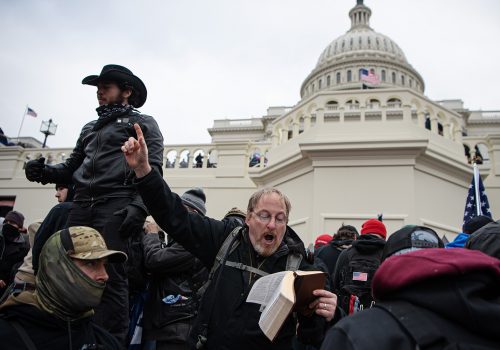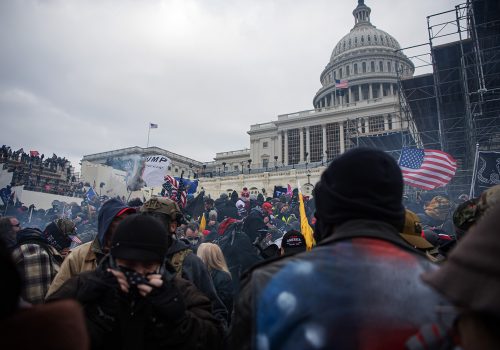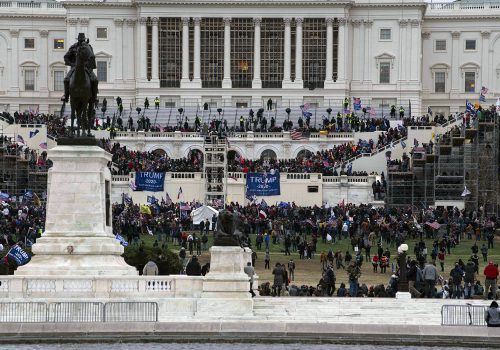FAST THINKING: What’s next for the insurrectionists?
JUST IN
The riot at the Capitol was conceived in plain sight, as we reported last week. For weeks on far-right networks across the web, extremists discussed their plans for violence. Is it happening again? Experts at our Digital Forensic Research Lab have been monitoring the chatter.
TODAY’S EXPERT REACTION COURTESY OF
- Graham Brookie (@GrahamBrookie): Director of the DFRLab
All eyes on inauguration
- It’s just eight days until Joe Biden’s inauguration. Graham says that many of the same extremist groups behind the January 6 riot have fixated on the days leading up to Inauguration, calling for more unrest surrounding the swearing in of the next US president. “We’re still living through a collective delusion,” he notes, as millions of Americans remain persuaded by Donald Trump’s false claims that the 2020 election was stolen.
- He adds: “At this point we know that there are protests planned by these same types of groups around the country for Inauguration Day.” Those plans include showing up in Washington, DC, which is typically on lockdown for the swearing-in ceremony and will be on even higher alert this time around, and in state capitals that might be far less prepared to deal with violent protests.
- “Especially as some of the main online hubs or influencers around this activity are suspended or removed and are regrouping in alternative online spaces, the more extreme groups that have a higher degree of coordination—like unlawful militias—remain engaged,” Graham says. “With heightened security, the extreme factions could be focused on softer targets.”
- And while some smaller planned events over the past weekend in DC and elsewhere fizzled, Graham tells us, the continued push shows that “even after the inauguration, this isn’t going away any time soon.”
How the online crackdowns are playing out
- DFRLab researchers have been following online discussions—on social media and in far-right forums—among groups that took part in Wednesday’s chaos, and they’ve detected two types of reactions among commenters who backed the riot. “The first [group] are shocked and appalled that it didn’t work and are going home. And then there are the people calling for more action,” Graham says. He describes the latter group as the “hardened core still calling for violent insurrection and strict adherence to conspiracy theories.”
- “De-platforming curbs momentum and audience growth for any conspiracy-driven ideology, but it can also harden the views of those already engaged,” he cautions. And whether online or in person, this hardened core can act as “catalysts” for the rest of the crowd.
- Tech companies are newly committed to blocking influential users who have been inciting violence. Both Facebook and Twitter have even banned Trump, while Google and Apple have pulled Parler, which had become a Twitter alternative for the far-right, from their app stores. (Amazon then booted Parler from its web-hosting services, further crippling it.) But will such efforts succeed?
- “It’s a massive pain” for the extremists losing their platforms, Graham tells us. “But a lot of these groups have been suspended or de-platformed before.” In other words: They’re experienced at getting around online moderation and migrating to networks, including private forums, where they can spread their message and coordinate. “They already have the muscle memory,” he says.
Will the crackdowns make things harder for authorities?
- The more that extremist groups are driven away from open and easily accessible online forums—and into more closed and often encrypted spaces—the harder it will be for authorities to keep track of them and their plans, Graham notes, calling this “a major vulnerability.”
- But he also sees cause for optimism, starting with the fact that the government and regular citizens alike are suddenly very aware of the threat. “The eyes of the entire country are on this issue right now, ” he says.
- Tech companies, too, are paying much closer attention: “They’re on high alert.”
Further reading
Thu, Jan 7, 2021
FAST THINKING: How the Capitol riot was coordinated online
Fast Thinking By
The team at the Atlantic Council’s Digital Forensic Research Lab has conducted exhaustive research into how the event happened, combing through social media and other networks frequented by the far right. Let’s break down what they found.
Thu, Jan 7, 2021
It all depends on what happens next
New Atlanticist By Daniel Fried
A mob summoned by the US president halted democracy in America. The long-term damage to the country depends on what happens next.
Wed, Jan 6, 2021
Learning from the abyss on Capitol Hill. What now?
New Atlanticist By Frederick Kempe
The trauma should prompt us to redouble our efforts within the United States and among allies and partners to simultaneously strengthen our principles and our bonds.
Image: A damaged window left unrepaired in the aftermath of Trump Supporters storming The Capitol. Chris Kleponis/Sipa via Reuters.


